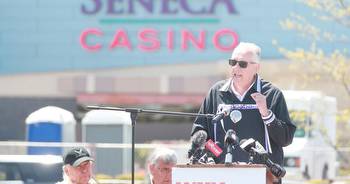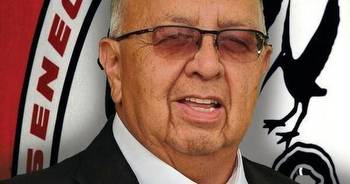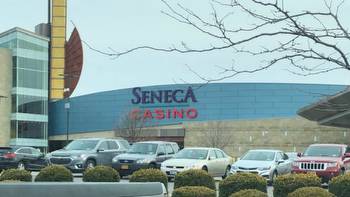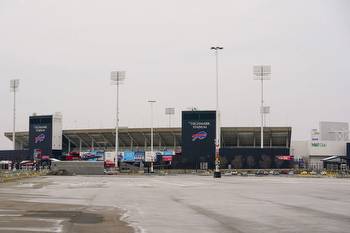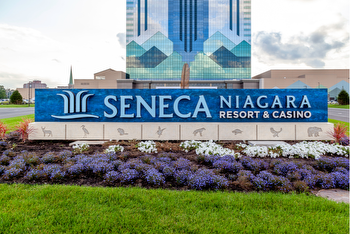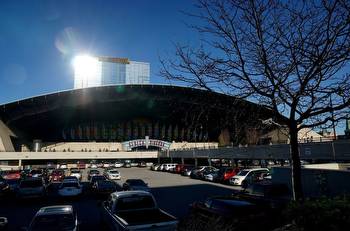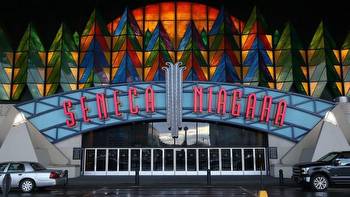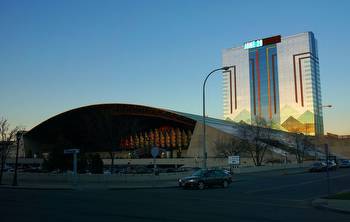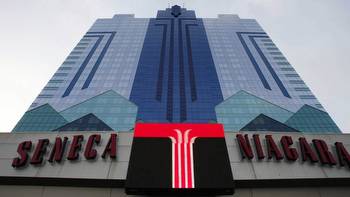Senecas still withholding casino revenue from New York pending federal inquiry
The Seneca Nation, dealing with internal strife over whether to pay hundreds of millions of dollars in casino revenue to New York State, will await the results of a federal inquiry into whether the revenue-sharing arrangement is legal before forwarding the funds.
Seneca President Matthew Pagels and Gov. Kathy Hochul publicly confirmed that they had a deal for that money to be turned over to the state and for negotiations to begin on a new casino compact.
“Rather than pursue continued legal action,” Seneca Nation President Matthew Pagels said, “we believe we can now best address our concerns in a compact with greater clarity on our obligations and ... the obligations New York State has to the Nation in return.”
It is unclear how long the federal review might further delay payments to Buffalo, Niagara Falls and Salamanca that the Senecas stopped more than four years ago.
Some Senecas accused Pagels of acting prematurely and without properly consulting Nation members before making the deal, although a Seneca court refused last week to stop Pagels.
The Nation’s 16-member Council voted Saturday to authorize release of the payments, but only subject to a final determination on their legality by the National Indian Gaming Commission, which started an inquiry in September.
The Cataract City and the Senecas are working on a plan that would locate a new downtown sports arena and family entertainment center a block east of the casino, Niagara Falls Mayor Robert M. Restaino said Thursday.
“The Department of Interior and National Indian Gaming Commission have raised concerns about the legality of the continued revenue share payments under the Seneca Nation’s gaming Compact and commenced a review of the matter several months ago. To date, neither agency has issued an official report, nor taken any legal action. After receiving community feedback, the Nation’s Council approved a resolution to continue holding Compact revenue share payments until the federal review is complete,” Pagels said in a prepared statement. “We hope such a report is finalized expeditiously so our Nation can move forward in charting the future of our gaming operations.”
The National Indian Gaming Commission in September expressed reservations about whether the amount the Senecas were expected to pay the state was fair and legal per the requirements of the federal Indian Gaming Regulatory Act.
The commission was reviewing financial information to determine whether the revenue share arrangement violated that act's requirement that tribes maintain “sole proprietary interest” in their gaming operations, according to a letter to Pagels from Thomas Cunningham, the commission’s chief compliance officer.
The Senecas ran out of options in federal court to continue withholding the payments, following a third ruling in December that sided with the state and upheld a 2019 arbitration panel’s determination that the Seneca Nation should pay up.
The Senecas didn’t appeal the latest ruling.
The latest ruling issued earlier this month by U.S. District Judge William M. Skretny said the Senecas must abide by an arbitration panel’s 2019 decision awarding the state a quarter of their slot-machine revenues from three Western New York casinos.
In a Jan. 12 announcement, Pagels said the Senecas "vigorously raised” many legal issues during a four-year court battle against the state. Rather than continue the legal fight, the Senecas will pursue their interests by negotiating a new casino compact with the state, Pagels said.
As part of a 2002 compact with the state, the Senecas received exclusive rights to operate casinos in Buffalo, Niagara Falls and Salamanca, with the understanding that 25% of slot proceeds would be shared with the state, which passed along a portion of that money to the casino host cities. The annual casino revenue sharing payments amounted to more than $100 million, and local municipalities counted on the funds to help balance their budgets.
The compact, which runs through 2023, included an automatic renewal at the end of 2016 that took effect for the remainder of the compact term when neither side objected to it.
When the Senecas stopped paying in 2017, they maintained that the renewal of the original agreement didn’t specifically call for further payments to the state.
In his letter, Cunningham said that that the 14-year period within which the Seneca Nation was to compensate the state for benefits that included gaming exclusivity, the use of the state’s eminent domain powers to acquire property and the transfer of the Niagara Falls Convention Center to the Senecas at the cost of $1 appeared to be “long since complete, yet the percentage of revenues the Nation is required to pay the State remain unchanged.”
“Moreover,” Cunningham added, “the economics have changed in the nearly two decades since the compact was entered into.”
The Nation’s anticipated average yearly contribution to the state in 2002 was $71.4 million, but since 2017, those contributions were averaging $117.5 million per year.
“The State appears to be receiving a revenue share that equates to a significant percentage of the Nation’s net revenues,” Cunningham wrote.
Cunningham referred a voicemail left by The News to Mary Parker, a spokeswoman for the National Indian Gaming Commission. Parker would not comment.








